Before coming to LSU, math junior Harrison Gietz started fully noticing the hundreds of life-threatening issues in the world.
He then heard about Effective Altruism and realized that with this program, he could use the resources he had to help address these problems.
Effective Altruism is a global community and social movement that aims to help others through evidence-based reasoning. Volunteers focus on problems they feel are most neglected, even when they are not easily accessible, and find the best way to reach out and solve the issue, Gietz said.
Gietz felt he could build a community of people by forming an Effective Altruism chapter at LSU that would be united by a passion for using evidence-based reasoning to do good in the community.
“I was really inspired to see a community of people who were taking a thorough and evidence-based approach to helping others,” he said.
Effective Altruism is a research field and practical community that aims to identify the world’s most pressing problems and find solutions to them while using those findings to do good, according to the Effective Altruism website.
The group is guided by five principles including commitment to others, scientific mindset, openness, integrity and collaborative spirit; and encourages students to reflect on questions like “How can we do the most good with our time and resources?” and “There are so many problems in the world; how can we decide which ones to prioritize?”
Effective Altruism also invites students to ponder the question “What does it mean to ‘do good’ in the first place?”
Gietz said that it’s difficult to come up with a concrete definition of doing good. He believes it could mean improving or creating well-being.
Some of his ideas to improve or create well-being include preventing diseases, improving factory farming conditions for animals and reducing risks from future pandemics.
The organization also encourages students to think critically about how they can use their skills and career to accomplish the most good if they choose to do so.
“It’s a really significant decision we make as students,” Giets said.
Philosophy and sociology senior Amie Ćemalović said she joined Effective Altruism to discuss the real-world implications of ethical approaches discussed in philosophy.
The organization has to think critically about current and future problems and find the root of each problem to form a solution. However, this is not always easy, she said.
“There remains endless discourse on what ought to be pursued and how we ought to pursue it,” Ćemalović said.
Ćemalović also said the organization impacts the world today through charity donations and volunteer work.
Political science junior Nathaniel Dela Pena joined Effective Altruism to learn others’ perspectives and methods on changing the world, in addition to his own.
Effective Altruism shapes lives and works with charities that can make an impact on global issues. The community is filled with like-minded people, trying to work to solve global problems effectively, Dela Pena said.
“In a world full of problems, we must value every last second and penny,” Dela Pena said.
Effective Altruism meets every other Thursday at 6:30 p.m. in the Student Union, and its first meeting is on Sept. 1.







